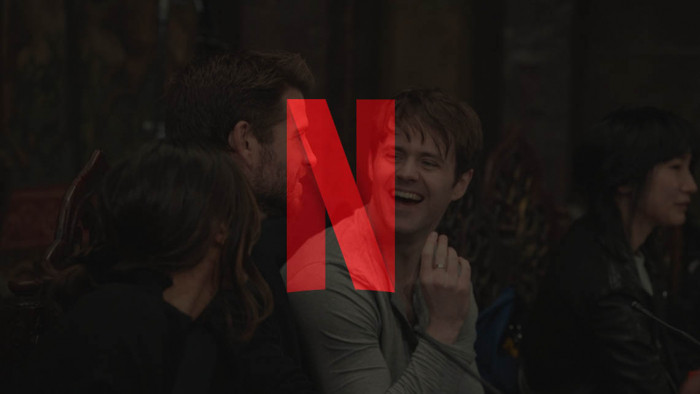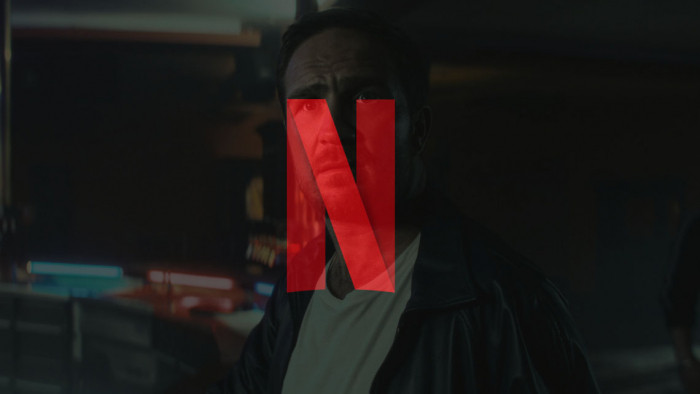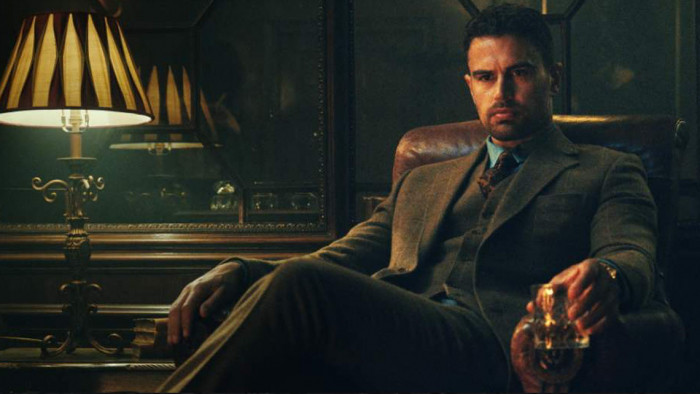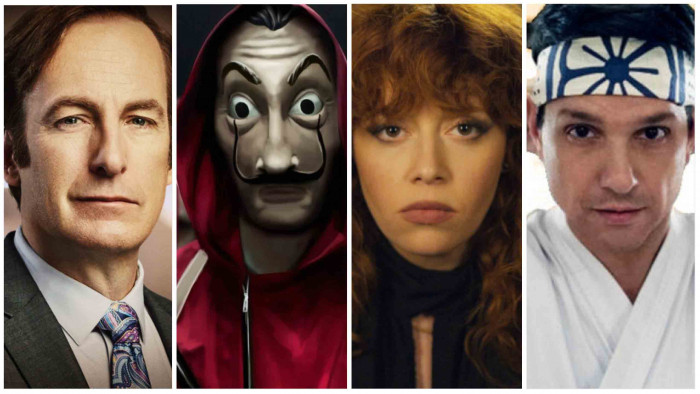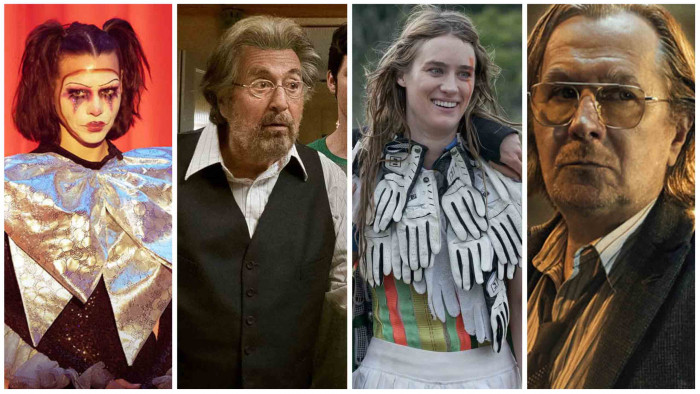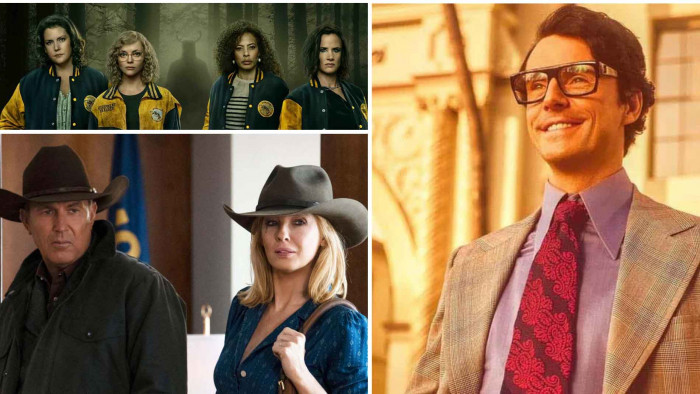Meet Jimmi Simpson: TV's nicest weirdo
The Westworld actor is about to go big, but that’s the last thing on his mind


We at this magazine possess great power. Not supernatural power – not yet – but the power, the privilege, to say to thousands: this is a man you should know about. He’s talented, he’s interesting, he’s one of the good guys and he’s going places. He’s one of us. One of you.
But this power is limited. We can’t dress just anyone in bright clothes, hand them a skateboard and pop them on our cover; we have to choose wisely, champion only those we truly believe in. And there a few we believe in more than Jimmi Simpson. I mean, just look him.
If you know Simpson, it might be because you had the good sense to watch Black Mirror’s series four zenith, ‘USS Callister’, a show he magnificently stole as philandering tech CEO James Walton in a tale of virtual reality going horribly wrong. Or perhaps you bumped into him as unnerving milk addict Liam McPoyle in It’s Always Sunny In Philadelphia, or paranoid hacker Gavin Orsay in House Of Cards.
But most likely you know him from Sky Atlantic-HBO behemoth, Westworld, which returns this weekend. In it, he plays William, a man who moseys slowly from dorkness to darkness across the vast landscapes of its futuristic Wild West fantasy theme park, populated with android murderers, prostitutes and doomed innocent bystanders. He even has an android love interest, which is somehow OK, possibly because she’s bad-ass and looks like Evan Rachel Wood (she is Evan Rachel Wood). Simpson is on a level billing with Wood, Thandie Newton, Ed Harris and Anthony Hopkins – and he matches them, scene for scene.

It’s an upward curve he attributes to landing a role in Sundance TV show Hap And Leonard in 2016, as a psychotic-yet-romantic killer called Soldier. This gave him the confidence, he claims, to bag his cowboy gig that same year.
“It was my first lead on TV and it was the first time I hated myself at work every day, thinking I suck,” he says. “Then I saw the end result and I was glad I thought I sucked because I kept working hard and it worked. It made me feel like I can do this.”
All wonderful, but there’s a clear pattern developing. Weirdos, killers, hackers, dystopias: all a little gloomy, isn’t it? Is he some kind of anti-moth?
“You could say that. I got into acting real late, so I didn’t have acting idols growing up. But someone gave me a copy of Richard Burton’s Hamlet on Broadway. I’d tried the drama club at high school and everyone was so dramatic – obviously. It wasn’t for me. It all seemed so big and artificial. When I saw Burton, it looked like a depressed, angry man who I could relate to. I guess because of that, I’ve been drawn to people who communicate through that dark place.”
Simpson, the human being, is the opposite of dark. He is Mr Ebullience. There is not one unenthusiastic cell in his body. This might be due to his second three-shot cappuccino of the morning – there to remedy jet-lag-induced insomnia – but the evidence suggests this is his resting state.
We’re sat in an East London café. You know the type: solid wood to convey artisanship; black-clad staff with a pallor that suggests a diet based on free lattes. With us is Simpson’s girlfriend, Sophia Del Pizzo, a British actor and comedian. She’s the reason he’s in London and, in four hours, a taxi will whisk him to Heathrow, from where he’ll fly home to Los Angeles. They’re donating to us their last moments here together, which is very generous, but then Simpson is a giver. Even he thinks so.
“I would describe myself as very big- and open-hearted,” he says, when I ask him to describe himself (saves me doing it). “Friendly. To an outsider, they’re probably the first vibes I give. I have a lot of passive love to give. Kind. A guy who helps his friends.”
With most interviewees, I’d wait for the straight face to crack, but Simpson really does emit those vibes. He wants you, everyone, to be happy (a couple of days later, he will call and email me to make sure I am). His voice is a sonic life coach; not heavily accented or particularly powerful, but oozing with you can do it. Del Pizzo nods, as if to say, ‘I know how it sounds, but it’s true’.
Physically, his self-portrait is less flattering.
“Lanky, but with promise towards a swimmer’s build,” he says. No straight face this time. It’s harsh. Think a six-foot-ish cousin of Christian Slater topped with successfully unruly light brown hair. Jürgen Klopp-ish clear-rimmed Wayfarer specs shield ice-blue eyes that must be worth an extra 10 per cent in auditions. His face says, ‘I’m curious’, somehow.

That’s probably because he is curious. He asks questions. Questions of you and your questions. Questions of himself, of humanity and the universe. No self-importance or petulance from Simpson; he’s a ‘big picture’ guy, brushing away triviality like breadcrumbs from the gingham tablecloth of life and expanding conversations to holistic, global proportions. We begin one such conversation by discussing the dim visions of near-future technology depicted in Westworld and ‘USS Callister’.
I ask, are we screwed? He’s given the matter prior scrutiny.
“It’s what we decide as a species,” says Simpson, calmly.
“If it moves in the direction of Donald Trump, of privatising everything citizens need, then we’re in a thankless, Blade Runner-like world where you’re either in the slums or you’re absolutely privileged. So yes, I’m frightened, but I also think that our next step in evolution is an enhanced ability to empathise.
“That’s where the species needs to go. Your brain chemistry changes depending on what you choose to think about. The more you factor in who your actions are hurting, the greater your propensity to be kind. We can’t go back to the ignorance of the Fifties and Sixties, which is what Trump seems to want, when black people were forced into slums and white people ruled supreme. We need to band together to stop that happening.”
Trump is a regular target. For unguarded hatred of the POTUS, browse Simpson’s Twitter feed. Or just listen to him in this café.
“We’ve been circling the drain since Trump was sworn in,” he adds, “but we’re not pooping this jerk out. It feels like, save your energy for the midterms and primaries, and force out the party that’s allowing the most ignorant dictator that ever lived to run the United States of America.”
It’s a great listen, but sadly time’s up, so we head to a nearby photographic studio and that skateboard. Girlfriend, acting and humanity aside, skating is Simpson’s great love. At 42, he’s been doing it for three decades. In a world where skate culture and style have been mass-appropriated, he knows his ollie from his backside 180.
“It’s a huge source of joy. There’s a relationship there, with something that mobilised you in high school. It’s like, hey old buddy. It’s my Chewbacca. Headphones, skateboard, in a no traffic area – it’s my Jimmi moment. I like the wind on my face, I like the pumping action, I like finding the gravity and curving it a little bit.”

Based on today’s evidence, that seems very ‘Jimmi Simpson’, but this gregarious, exuberant version hasn’t always existed. Not to this degree. Ignoring the make-up brush dusting his face, he tells me how, in 2012, a livelier set of wheels changed everything.
“This is all titanium,” he says, pointing to a six-inch scar along the right side of his collarbone.
“It happened a few months after a 12-year relationship ended [his marriage to New Zealand actor Melanie Lynskey]. I was a middle-aged boy. I’d been a long-term relationship addict and now I was alone, lost. So, I bought a motorcycle. I started working out. I’ll be this guy, I thought. I’ll attract women with my biceps and my motorcycle.
“One evening, my friend called and asked me to help put up some shelves. I said sure. I got on the freeway, and from then I have no memory. I was found convulsing in the middle of oncoming traffic. Someone had hit my front tyre, I’d come over and all the impact had gone on to this [his collarbone]. I woke up in hospital 15 hours later with texts from my friend asking where the hell I was! I had this revelation: I was broken and I had nobody to look after me.”
It took Simpson a year and a half to recover, a period he describes as being in a cocoon; reflecting on who he was and what he wanted to be, before emerging as the man he described in the café.
“My core was the same but the gratitude level skyrocketed. I don’t half-ass things anymore. I don’t want to end this life thinking I just hung around. And I try not to worry about the little stresses. When everything is smooth in your life, it’s: ‘The internet doesn’t work!’ or: ‘Goddamn traffic!’
I would let those irritants get to me and carry them with me for hours. You can say you won’t sweat the small stuff, but unless you’re given perspective, and understand that it’s truly small stuff, that’s what you’re gonna do.”

Soon Simpson is goofing around on the skateboard: rolling across the studio, pulling faces, holding poses, suggesting shots, loving the vivid threads, making sure, of course, that everyone’s happy. He’s in and out of the dressing room like an unleashed puppy – one containing six espressos’ worth of caffeine. He’s chopping and changing his hair, switching spectacle frames. At one point, he’s literally bouncing off the walls, board in hand.
I wonder what he’s like when he’s had a good night’s kip. As Del Pizzo tells me, among many loving compliments, it’s like he’s from another planet. If so, he’s one of those nice aliens. Mork, maybe, or a good-looking ET.
As he goes to change back into his civvies, Simpson beckons me. He really wants to talk about Unsolved. In it, Simpson plays Detective Russell Poole, who went to the grave convinced of a conspiracy connecting the LAPD, Death Row Records and the murders of Tupac Shakur and Biggie Smalls. It doesn’t even have a UK air date, but so keen is Simpson to mention Unsolved, he’s doing it uncovered. For the first time in my career, I’m interviewing an actor in his smalls.
“I’m proud to be part of a show that’s important,” he says. “It’s bringing up a dialogue in a country that has chosen to ignore how racist it is until we have a racist president. We’ve let this river of hate keep flowing. It’s broken through and the volcano’s name is Trump.”
It’s about the big stuff again. His taxi is waiting outside and, while everyone else is getting twitchy, he’s still in his underpants talking about racism. As we google the estimated time to Heathrow, he’s shaking everyone’s hand, thanking them individually. That’s what you take away from Jimmi Simpson: he makes you want to stop sweating the small stuff. You can’t, obviously, but you want to – and that’s a start.
(Photography: Tom Oldham)
